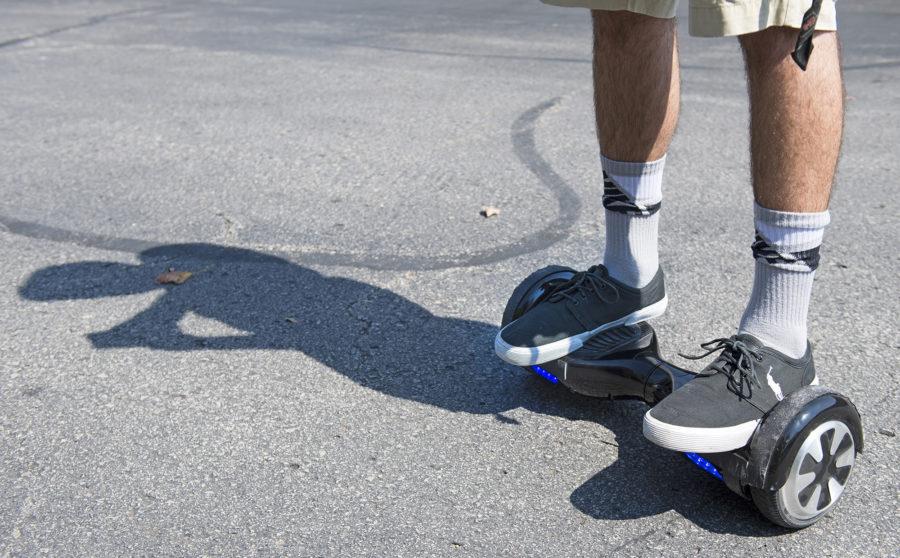University hoverboard ban goes into effect
Logan Meis, 20, balances on his hover board outside his apartment complex in Overland Park, Kan., on Friday, Sept. 4, 2015. Meis purchased the personal transportation device for about $330 online. (Tammy Ljungblad/Kansas City Star/TNS)
January 19, 2016
The University’s new hoverboard policy, announced on Jan. 4, went into effect Monday, banning the battery-operated self-balance scooters from all University owned facilities due to recent fire risk concerns.
“The ban includes classrooms, laboratories, meeting rooms and all other campus facilities. Students living on campus with hoverboards in their homes are being asked to “make arrangements to remove them from campus,” according to a University housing press release.
According to USA Today, more than 30 colleges across the U.S. – such as American University and Butler University – have banned the boards due to similar safety concerns. The majority of the schools cite the hoverboard’s fire risk as the main reason for wanting to keep them off campus.
Robin Kaler, campus spokeswoman, said hoverboards are currently only prohibited in indoor facilities on campus, but University Housing may institute a greater ban in the future.
“Although the prohibition does not apply to outdoor areas such as university-owned streets, sidewalks, walkways and parking lots, individuals using hoverboards to travel on campus will not be able to bring them into any university buildings,” according to a press release.
Get The Daily Illini in your inbox!
“We are still looking at national fire (and) consumer product recommendations. We will put some sort of addendum to the campus administrative manual and code as soon as we determine what we feel is safe and appropriate,” Kaler said.
According to the Campus Administrative Manual, students found in violation of the University’s ban on skates, skateboards and now hoverboards could face sanctions including referral to the student disciplinary system, Illinois Vehicle Code citations and/or arrest for any applicable criminal offenses.
According to a statement from Consumer Product Safety Commission Chairman Elliot F. Kaye, the agency is currently investigating hoverboards and have taken possession of hoverboards that caught fire.
“CPSC engineers in our National Product Testing and Evaluation Center in Maryland have tested and will continue to test new and damaged boards in search of an answer for why some models caught fire during the charging stage and others caught fire while in use,” Kaye said. “Our expert staff is looking particularly closely at the configuration of the battery packs and compatibility with the chargers.”
Kaye also issued a warning about the risks associated with falling from hoverboards.
“CPSC has received dozens of reports of injuries from hospital ERs … Some of these injuries have been serious, including concussions, fractures, contusions/abrasions, and internal organ injuries,” Kaye said.
The National Fire Protection Association released a fire safety warning on hoverboards, detailing hoverboard fire safety tips.
According to the press release, individuals should not leave charging hoverboards unattended and should call 911 in the event that their hoverboard shows signs of leaking fluid, excessive heat, odor, sparking or smoke.
In light of fire risk concerns, some students agree that the ban is a good idea.
“I think it’s probably for the best,” said Kayla Benz, Junior in ACES. “I don’t think there’s a use for them, people can walk to class or take a bus.”







